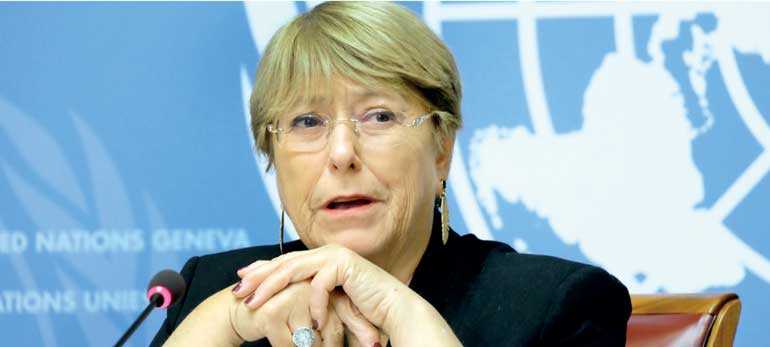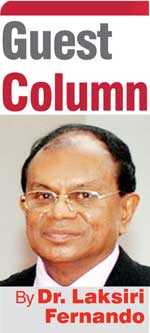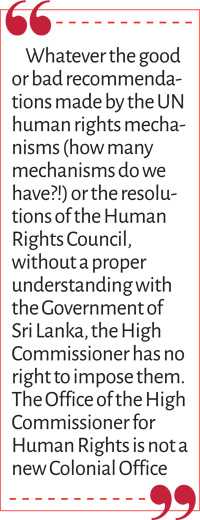Thursday Feb 19, 2026
Thursday Feb 19, 2026
Saturday, 20 February 2021 00:05 - - {{hitsCtrl.values.hits}}

UN High Commissioner for Human Rights Michelle Bachelet
 I can be very clear and blunt. The Office of the UN High Commissioner for Human Rights is going in the authoritarian and dictatorial direction preaching others to be democratic and justiciable. This is very clear from the report on the ‘Promotion [of] Reconciliation, Accountability and Human Rights in Sri Lanka’ (A/HRC/46/20). In February 2009, Castro called her part of the ‘fascist and vengeful Chilean oligarchy.’
I can be very clear and blunt. The Office of the UN High Commissioner for Human Rights is going in the authoritarian and dictatorial direction preaching others to be democratic and justiciable. This is very clear from the report on the ‘Promotion [of] Reconciliation, Accountability and Human Rights in Sri Lanka’ (A/HRC/46/20). In February 2009, Castro called her part of the ‘fascist and vengeful Chilean oligarchy.’
The time allocated for the discussion of this politically-biased report is from 3 to 6 p.m. on 24 February, just three hours. It is still not clear whether some of the UNHRC sessions starting on 22 February would be online (virtual) or with actual participation of the members. It would be grossly undemocratic if the Higher Commissioner intends to get a resolution passed on Sri Lanka without giving adequate time to the country or the other members. This is still to be seen.
The High Commissioner has made 11 recommendations to the Government of Sri Lanka; seven recommendations to the Human Rights Council and UN Member States; and 4 recommendations to the United Nations entities, the last ones numbered as a, b, c, and e! Of course, this is an unedited version, but this is what we can find in their website.
To the Government?
Let me just quote the first two recommendations aiming at the Government.
“(a) Actively promote an inclusive, pluralistic vision for Sri Lanka, based on non-discrimination and protection of human rights for all, and in line with the 2030 Sustainable Development Agenda;
(b) Ensure constitutional and legislative reforms address [sic] recommendations made by United Nations human rights mechanisms and the resolutions of the Human Rights Council;” 
A vision of a country is completely a national policy matter, in the case of Sri Lanka decided through political party politics and through competitive elections, right or wrong. Who is this High Commissioner dictating terms for a ‘vision for Sri Lanka’ giving the impression that the country has no efforts to be ‘inclusive’ or ‘pluralistic’? I will explain to you who she is later.
Whatever the weaknesses in implementation, ‘non-discrimination and protection of human rights’ are enshrined as the fundamental rights chapter in the Constitution. Just because a governmental change has happened (2020) to the dislike of some international actors or bureaucrats at the Office of the Higher Commissioner, people’s approved policies should not be condemned in UN documents.
Whatever the good or bad recommendations made by the UN human rights mechanisms (how many mechanisms do we have?!) or the resolutions of the Human Rights Council, without a proper understanding with the Government of Sri Lanka, the High Commissioner has no right to impose them. The Office of the High Commissioner for Human Rights is not a new Colonial Office.
To the Human Rights Council and Member States?
Let me quote only the recommendations (c) and (d) to drive my point.
“(c) Cooperate with victims and their representatives to investigate and prosecute international crimes committed by all parties in Sri Lanka through judicial proceedings in domestic jurisdictions, including under accepted principles of extraterritorial or universal jurisdiction;
(d) Explore possible targeted sanctions such as asset freezes and travel bans against credibly alleged perpetrators of grave human rights violations and abuses;”
The first paragraph means bringing the Sri Lankan nationals alleged to have committed international crimes before the domestic jurisdictions in foreign countries. This is like going back to colonialism at a larger scale. The High Commissioner also asking those foreign countries (undoubtedly some Western countries) to cooperate with (alleged) ‘victims and their representatives.’ Who are these representatives? The High Commissioner should spell them out clearly.
It appears that some conspiracy or collaboration is going on behind the scenes. In the second paragraph, targeted sanctions like ‘asset freezes’ and ‘travel bans’ are also recommended. Of course, there are no names in the recommendations. But there are some names in the body of the report. Almost all are linked to the present Government. 
Have they been convicted? And in what courts of justice? Has the High Commissioner also become a Judge? Two prominent names among these are Lieutenant General Shavendra Silva, the present Army Chief, and Major General (retired) Kamal Gunaratne, the Secretary to the Ministry of Defence. Is this an attempt to bring down the Government of Sri Lanka? What the report says is the following.
“The High Commissioner is particularly troubled that these appointments include senior military officials who have been alleged in United Nations reports to be implicated in alleged war crimes and crimes against humanity during the final years of the conflict, including Lieutenant General Shavendra Silva, as Army Chief (in August 2019) and Major General (retired) Kamal Gunaratne, as Secretary to the Ministry of Defence (in November 2019).”
There is a saying (in Sinhala) ‘kata boru kiwwath diva boru kiyanne naha.’ It means ‘even if the mouth utters lies, the tongue doesn’t.’ Look at the second and third lines of the above paragraph. It says, “senior military officials who have been alleged in the United Nations reports to be implicated in alleged war crimes and crimes against humanity.” What it says is that they are not convicted or proved, but they ‘will be implicated’ in war crimes.
Conclusion: Utter hypocrisy
Let me finally quote what the report says about the new appointments to the Human Rights Commission of Sri Lanka (HRCSL). “In December 2020, the President proceeded with the appointment of new members to the HRCSL, including a former Minister as chairperson. The High Commissioner is concerned that the new appointment process undermines the credibility and independence of the Commission.”
On this matter, I could agree with the High Commissioner although even the Paris Principles on national human rights institutions specify the representation of Parliament also as a category. Of course, not as the Chairperson.
However, the comedy is that the High Commissioner who makes this observations or accusations herself is not just a former Minister but a former President of a country, Chile (2006-2010 and 2014-2018). She is utterly political.
As a Minster of Defence (2002-2004) she is known to have wearing sometimes a military cloak and a cap. In her fairly young days (1985-1987) she was alleged to have connections with the Manuel Rodriguez Patriotic Front, ‘an armed group that among other activities attempted to assassinate Pinochet in 1986.’ During her presidency she was known to have tried to preach and dictate terms to other Latin American countries. She visited Cuba in February 2009 to meet with Castro.
The meeting with Castro backfired when Castro wrote a day later that the “fascist and vengeful Chilean oligarchy is the same which more than 100 years ago robbed Bolivia of its access to the Pacific and of copper-rich lands in a humiliating war.” (Michelle Bachelet – Wikipedia).